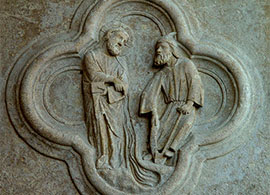Jeremiah Week 4
From Bad to Worse
Professor of Theology, Loyola University Maryland
Read this week’s Scripture: Jeremiah 11:1-15:9
18:34

 Enlarge
Enlarge
In this section of Jeremiah, we learn that Judah cannot avoid God’s judgment. There is nothing Jeremiah can do or say. On top of this, God announces that Jeremiah’s work is going to get harder. This represents one of the low points of the book. It reminds us that when we think of vocation and God’s call to each of us, it is not always a call to participate in great and glorious ventures. It is not always a call to popularity and security.
Judah’s Disobedience and Idolatry
The first part of Jeremiah 11 sounds a lot like Deuteronomy. Keeping the Sinai covenant means obeying the commandments. Obeying the commandments is the way to keep Israel’s relationship with the LORD in good working order and is essential to living peacefully in the Land. From the time the LORD led Israel out of slavery in Egypt, obedience has been difficult. The people stubbornly resisted walking with the LORD on the LORD’s terms.
After this retrospective account of Israel’s past disobedience, Jeremiah 11:9 shifts to the present. Judah has continued this pattern of disobedience. Moreover, God identifies this obedience as the result of a “conspiracy” (Jeremiah 11:9). According to the LORD, one does not accidentally back into this level of disobedience; it is planned, purposeful. One can see this from the observation that the people of Judah have as many gods as they have cities, and each street in Jerusalem has an altar to Baal (Jeremiah 11:13). Such purposeful, comprehensive disobedience calls forth God’s judgment.
Throughout this passage, the LORD characterizes the peoples’ disobedience, both past and present, in terms of a failure to hear or to listen (Jeremiah 11:2, 6, 8). This emphasis recalls Deuteronomy 6:4–5: “Hear, O, Israel, the LORD is our God, the LORD alone. You shall love the LORD your God with all your heart, and with all your soul, and with all your might.” It seems as if God traces all of Israel’s and Judah’s failures back to a fundamental refusal to listen to this call. In the light of Judah’s failure to listen, God will not listen to their pleas for rescue. Even if Jeremiah himself were to intercede for them, God will not listen. Indeed, God forbids Jeremiah from praying on Judah’s behalf (Jeremiah 11:14).
Although the people might hope that increased sacrifice and ritual activity would placate a god like Baal, the LORD is not interested in such activity. God’s words in Jeremiah 11:15–17 indicate two important facets of the idolatry of the people of God. First, it is never total. That is, even as Judah sets up a multitude of altars and shrines to other gods throughout the country, they never fully abandon the LORD. The LORD simply becomes one of many deities to be honored or placated with sacrifices. Of course, in the light of Deuteronomy 6, this is hardly the wholehearted, single-minded devotion the LORD commands. Second, it becomes clear that the people now conceive of the LORD as a petulant god who requires regular sacrifices in order to attend to the needs of the people. Their understanding of a relationship with the LORD is shallow and one-dimensional. They seem to think that the LORD is simply suffering from hunger pangs. If they offer food, all will be well. In contrast to this attitude, the LORD speaks of Judah as “beloved” (Jeremiah 11:15). As the chapter develops, Judah is characterized as a cultivated olive tree, planted by God. Although this image might lack the interpersonal tone of a lover and one beloved, it still displays God’s calling and intentional cultivation of Israel. Moreover, it also establishes God’s authority to prune, or uproot and burn, the tree which the LORD has planted.
Things Will Only Get Worse
As chapter 12 begins, the focus of the text changes dramatically. Here Jeremiah speaks to the LORD and raises direct and heartfelt questions. At the very outset, he voices his recognition and commitment to God’s righteousness. He is, however, concerned about God’s manner of judgment. Why does this righteous God allow the wicked to persist and even to prosper? Surely God must know that their piety is superficial and their actions betray a deep level of corruption. Jeremiah seems to suggest that while he himself is subject to God’s close scrutiny, God does not seem to pay attention to the corruption of these people. The very fact that such obviously unrighteous people prosper provides fodder for those who claim that God is not really paying attention to the people; they can act as they wish.
God does not respond directly to Jeremiah’s observations. Instead, God suggests that things are going to get more difficult for Jeremiah. If he finds his current situation exhausting, how will he cope with what is to come? God compares Jeremiah’s present tiredness to running with humans and stumbling while living in a safe land. The future will require racing against horses and surviving in a hostile wilderness (Jeremiah 12:5). On top of this, Jeremiah is warned that the resistance to his message will become so pervasive that his own kin will turn against him. He should not trust them. The demands, the dangers, and the trials of Jeremiah’s prophetic ministry are only going to increase. The question of the prosperity of the wicked is pushed into the background. God’s call here starts to sound very much like Jesus’ call to his disciples to abandon everything, take up the cross, and follow — no matter the cost.
Judgment and Hope
God continues to speak. Now, however, Jeremiah is not the focus. Instead, God laments that despite God’s love of Judah, the people have become alienated from, and even antagonistic toward, God. The relationship is in disrepair. As a result, God will hand over Judah to judgment. The land will be destroyed; people will struggle to make a living on the land, but their toil will not result in a productive harvest.
Chapter 12 ends with a strange and unanticipated announcement. Just as God will uproot Judah for her betrayal, God will also uproot all of the surrounding nations who take advantage of Judah’s troubles (Jeremiah 12:14). Surprisingly, however, God also promises to show compassion on these nations. They, like Judah, are invited to call upon the name of the LORD instead of Baal. The nations that do this will be “built up among my people” (Jeremiah 12:16). This seems to be a promise to incorporate those nations that turn to the LORD into the people of God. The image is not as developed as in Isaiah 2, but it appears that the LORD is promising to welcome those nations who turn to God, as well as promising to uproot those nations who do not.

 Enlarge
Enlarge
Images of Brokenness
Having pronounced judgment on Judah and Jerusalem verbally, God now instructs Jeremiah to enact a parable of judgment (Jeremiah 13). Jeremiah is instructed to buy a linen loincloth. After wearing it for some time, God tells Jeremiah to go bury the loincloth at Perath. There is some uncertainty about the precise location of this place, but that is not crucial to the interpretation of the parable. Jeremiah does as God commands. Again, after some time, God tells Jeremiah to dig up the loincloth and bring it back. Not surprisingly, the loincloth is ruined. This leads to the interpretation of the enacted parable in Jeremiah 13:8–11: Judah and Jerusalem will be ruined like the loincloth. The people have refused to manifest the single-minded, wholehearted devotion that God calls for. Instead, they have followed other gods. Hence, they will be rendered as useless as the loincloth. Finally, in verse 11, we are presented with the image that makes the parable hang together. Israel and Judah were bound to the LORD like a belt. This situation should have resulted in their glory. Instead, they refused to listen, effectively breaking the belt that bound them to the LORD.
In Jeremiah 13:12–14, we read the brief oracle about wine jars. This oracle is simply obscure. We do not know if the phrase, “Every wine jar should be filled with wine,” reflects an idiom or proverb. Its assertion in verse 12 anticipates that everybody knows this already. What they don’t know is that these wine jars are going to produce drunkenness on a vast scale. If the image of drunkenness in Jeremiah 25:15–29 shapes our understanding of this similar image here in Jeremiah 13:12–14, then drunkenness reflects instability and unreliable decision-making — practices that bring God’s judgment in its wake.
The next passage begins with that familiar invocation to “listen” to what God says and to obey (Jeremiah 13:15). This invocation is followed immediately by an admonition to avoid self-exaltation. This reminds readers that appropriate “hearing” or “listening” to God requires a disposition of humility. This disposition primarily requires both knowledge of oneself and knowledge of oneself in relation to God. Such humility will allow one to “give glory to the LORD” and thus avoid judgment (Jeremiah 13:16).
Failure to listen will bring exile for Judah and deep grief for Jeremiah. His grief is focused on Judah’s pride. This is what keeps Judah from giving glory to the LORD and will result in her exile. The ruling family and all of Judah will be exiled.
Among all of the images of judgment and destruction that one reads in Jeremiah, I suspect that none will be as troubling to us as when judgment is described using images of sexual violence in Jeremiah 13:22–27. Culturally, sexual violence in the ancient world was seen as a form of punishment. Modern American society is slowly coming to recognize that the victims of sexual violence are not to blame. This understanding represents a large and hard-won cultural shift. The imagery of Jeremiah is driven by Judah’s betrayal of the LORD’s love and of the covenantal commitment that binds Israel and God together. Moreover, this betrayal is not an isolated event. Rather, it is a habit. When the people ask themselves why this has happened, the reply focuses on the fact that they have become habituated to betray the LORD by following other gods. They can no more change their ways than a leopard can change its spots.
The Habit of Idolatry
Regardless of the propriety of the images presented here, Jeremiah touches on a very real aspect of idolatry. That is, it becomes a habit. Slowly, incrementally, the worship of other gods becomes something normal and natural for the people of Judah. They cannot imagine things otherwise. Habit shapes imagination; imagination focuses our hearing and seeing. An imagination shaped by the habit of idolatry can no longer listen to or hear Jeremiah’s call to repent.
Chapter 14 shifts the image of judgment away from sexual violence to drought. There is simply no water. Humans and animals suffer alike. This serves as a potent reminder that all of creation suffers due to human sin.
In verses 7–9, we hear the voice of the people. The people cry out to God, baffled by the LORD’s seeming indifference to their plight. Although they recognize their sin, they do not understand their sin in such a way that makes this drought intelligible to them as God’s judgment. Instead, they seem to think that God is simply inattentive to their need, rather than the cause of their trouble. These verses are an excellent example of how habit shapes imagination. In this case, the people’s habit of “wandering” from the LORD (Jeremiah 14:10) has distorted their understanding of God and their relationship to God. Wandering has become so ingrained in the people that they are now incapable of understanding the events happening around them as the direct result of that wandering.
Again, the LORD tells Jeremiah not to pray for the well-being of these people (Jeremiah 14:11). Jeremiah replies that the people are really the victims of prophets who misleadingly tell them that God would never hand them over to judgment (Jeremiah 14:13). In response, God does not excuse the people, but does promise judgment on such deceptive prophets (Jeremiah 14:14–16).
Jeremiah’s Lament
God then invites Jeremiah to lament in 14:17–22. This lament begins in grief: tears without end for the comprehensive destruction of Judah. Field and city are laid waste. Prophet and priest are taken away. This grief turns into a plea to God which appears very much like the plea God told Jeremiah not to offer in 14:11. Jeremiah calls out to God, confessing the nation’s sin; recognizing God’s comprehensive power to save; imploring God to remember the covenant with Israel.
In response to the lament, God is resolute. Even if Moses and Samuel were to plead for these people, God will not relent. Of course, both Moses and Samuel have, at crucial times, interceded with God on behalf of the people. If anyone’s prayers could turn back the LORD’s judgment, it would be those two. Nevertheless, God commands Jeremiah to “send this people from my presence” (Jeremiah 15:1). As the next three verses indicate, there is no safe place for them to go. Judah will fall prey to disaster, and it is simply a question of which disaster they will encounter first. Judah has rejected the LORD; God’s patience is exhausted. What follows is a grim litany of judgment, destruction, and suffering (15:6–9).
In the previous Lectio, I noted that lament such as we find in Jeremiah presupposes a deep solidarity with the suffering people of God, even when that suffering is self-inflicted. In this section, lament spills over into a plea for mercy. Jeremiah shifts responsibility for Judah’s sin onto her leaders. They have misled the people and should be punished, rather than the people as a whole. God’s response to this plea implicitly rejects Jeremiah’s attempts to focus responsibility on Judah’s leaders. Yes, the leaders have misled the people. Nevertheless, the people are also responsible for their wandering from the LORD. No pleas for mercy will be effective until God has executed judgment on Judah. This is one of those passages in Jeremiah that indicate that things are too far gone for Judah to alter the course of God’s impending judgment. Other passages will hold out the prospect that repentance may forestall judgment, but that is not the case here. As the text unfolds, however, it becomes clear that whether or not Judah could have forestalled God’s judgment, they did not repent and did not see the need to repent.
Questions for Further Discussion
- Why do you think God repeatedly tells Jeremiah not to pray for the people of Judah (Jeremiah 7:16; 11:14; 14:11)? How does that affect your understanding of God or of prayer to God?
- This week’s reading contains much judgment and lament. What images of hope and restoration do you notice? What is the relationship between judgment and restoration?
- Read Jeremiah 12:14–17. What stands out to you from this passage? How does God interact with the nations?
<<Previous Lectio Back to Jeremiah Next Lectio>>

This work is licensed under a Creative Commons License.




